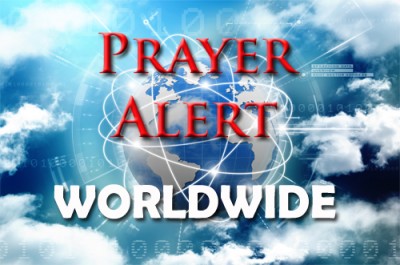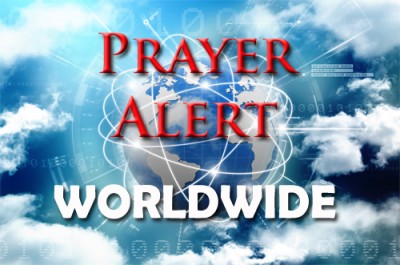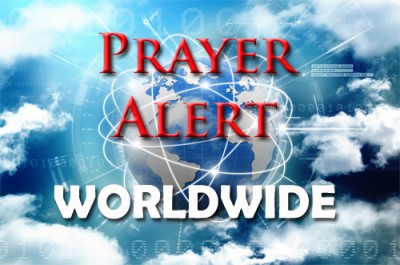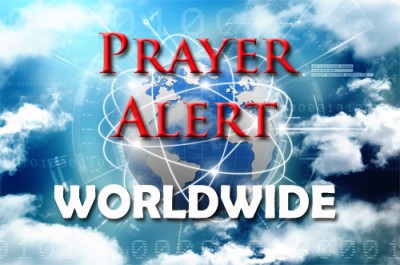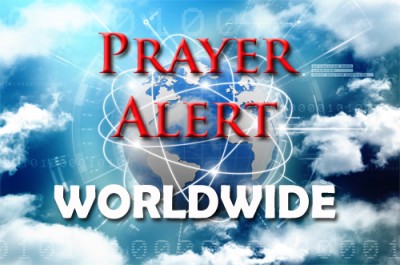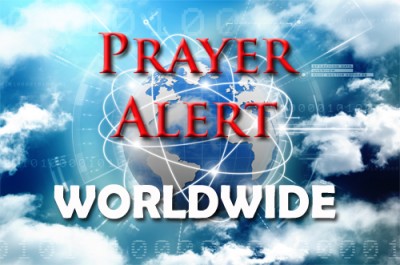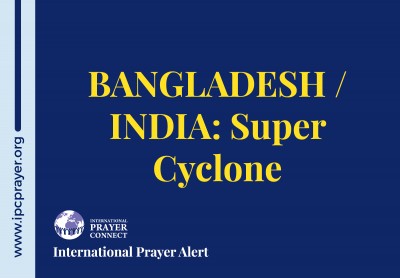Uganda: Sarah’s story
21 May 2020Sarah remembers her childhood fondly. She was close to her parents, who were always loving towards her, and she never saw them fight. She pursued her studies and helped her parents care for her four siblings. Tragically, when she was 16, her father passed away. Sarah was forced to leave school and work so that her siblings could continue their education. Next she met Komakech. He won her affection and they began living together. Sarah thought he would take good care of her family. But she slowly became aware of his violent nature. Within three months he became violent, drinking and abusing Sarah physically, and emotionally. One in two Ugandan women experience spousal abuse. Rates are higher in northern Uganda. To read Sarah’s story of freedom. click the ‘More’ button.
Yemen: Houthis ‘concealed’ coronavirus outbreak
21 May 2020Yemen’s Saudi-backed government has accused the Houthis of covering up a large outbreak of coronavirus in areas that they hold, and has called for urgent global assistance to help their war-ravaged health sector deal with coronavirus. The United Nations warned that the country could suffer a ‘catastrophic’ food security situation due to the pandemic. The WHO said that the virus is spreading undetected among the population in the country, control of which is divided between the government in the south and the Houthi group in the north.
Bangladesh / India: Cyclone Amphan
21 May 2020Super Cyclone Amphan, the strongest storm ever recorded in the Bay of Bengal, has devastated Bangladesh and India with sustained winds of 165 mph - equivalent to a category 5 hurricane. Up to 300,000 people in coastal areas are in immediate danger from deadly storm surges and flooding. Thousands are homeless. India’s worst damage is in West Bengal's coastal districts that were ‘pulverised’. Nearly every coastal district in Bangladesh was damaged. Evacuations across the region were complicated by the pandemic, as authorities tried to maintain social distancing rules. Pray for the thousands left homeless as Amphan heaps misery on coronavirus-hit communities, particularly the 14 million in Kolkata - situated in its direct path. Pray for those in mourning, the injured, and those clearing debris from impassable roads, rescuing flood victims and organising aid as heavy rains continue to fall on hard-hit areas.
Mexico: health workers attacked
21 May 2020Social media report that doctors have been assaulted by relatives of coronavirus patients, and health workers attacked verbally and physically. Daniel, wearing his hospital cleaner uniform, was brutally attacked on a bus by people shouting ‘dirty’ at him. He thought it was never going to end. Nurse Melody came face to face with residents blocking her path when she tried to return home. She said ‘If I entered the village I wouldn't be allowed to leave again. It would be better if I didn't enter because I came from a source of infection.’ She is temporarily renting a flat elsewhere. Experts believe that the attacks reflect the public's fear of what the medical workers represent in a country with tens of thousands of deaths. Unlike other traumatic events, cannot be avoided, and generates more fear motivated by ignorance and fright. The national guard is now in hospitals, and some medical workers receive government transport for long commutes home.
Ghana: children trapped on Lake Volta
21 May 2020Thousands of children work in Lake Volta’s massive fishing industry: many are slaves. Children as young as 4 are abused and malnourished. Their work is dangerous; drowning and other hazards are a constant threat. Victims rise before dawn to go out and dive down into the dark water to untangle fishing nets. IJM estimates that nearly two-thirds of children working on the Lake are trapped in slavery. Since 2015, 164 victims have been rescued from the lake’s fishing industry, and 31 suspected traffickers have been arrested. Today thousands of children are trapped there. Before the lockdown IJM were about to launch rescues. Pray that these children will be found and saved now that lockdown is lifted. Pray that IJM will be able to access communities and offer support where needed.
USA and the WHO
21 May 2020The world's worst health crisis in a hundred years is not the best time for the WHO to lose its largest financial supporter. The Trump administration says the WHO ignored early warnings about coronavirus spread, took at face value Chinese efforts to downplay it, and failed to send researchers into Wuhan for vital investigation at an early enough stage. Unless WHO shapes up to better serve ‘American interests,’ it will stop funding them in 30 days. Some are asking ‘Is WHO in need of urgent reform, or is it imperfect but better than any current alternatives?’ Also, WHO refused to provide information directly to Taiwan - which is excluded from WHO membership - out of respect for China's wishes, putting millions of Taiwanese at unnecessary risk. President Xi has pledged up to $2 billion to help the WHO's global pandemic response efforts.
Just happened to be up in the night here and got this urgent prayer concern from Bangladesh and India through a good friend. A huge cyclone is on its way to the eastern coastal area of these two nations and should be making landfall about now. One Christian leader describes a similar but weaker cyclone that hit the coast in 1970: "In one hour 500,000 people and two million cattle were killed by a storm surge fifty feet high that raced inland fifty miles. In those days there was no early warning system, and there were no roads. In the next six months another 500,000 died from pestilence and disease. Cyclone Bhola was the worst meteorological disaster in recorded history."
Now a cyclone twice as strong is speeding towards the same area where millions live in its direct course and some Christian mission leaders there report:
“Cyclone Amphan overnight strengthened and became a Super Cyclone, the "strongest storm ever recorded over the Bay of Bengal". It is heading like an arrow straight for the border of India and Bangladesh. Please pray.
Millions will be affected. And most all in the path of this dangerous storm are already under attack from the novel coronavirus. For those along the coastline, the only hope of survival is to crowd into the new storm shelters built fifty feet above sea level. But, social distancing there is impossible.
… At that time 400,000 Rohingya refugees had fled over the border to Bangladesh, fleeing persecution.
Sadly, this tragic genocide is ongoing, and now more than 1,000,000 stateless Rohingya are crowded in desperate conditions along the south-east border of Burma/Myanmar and Bangladesh.
Pray especially for the Rohingya to weather the coming storm...And, coronavirus continues to spread rapidly. We really must ask God to calm this storm before it comes ashore. Please do pray now! “
Here is a news clipping about this situation as well:
Let's do pray for this storm to weaken and not to bring the feared and horrific destruction and loss of life that was experienced before. Pray for people in the path of the cyclone to get to higher ground and safety in time. Pray for effective relief and rescue efforts where needed. May these dear people and their children be protected from both the storm and the coronavirus that they fear so deeply and through these crises turn to Jesus Christ and come to know Him.
Thanks for joining us in prayer.
John Robb / Dr Jason Hubbard
International Prayer Council
We want to personally thank you for your involvement in the World Prayer Together May 1st prayer event! Thank you for your anointed intercession, Christ-exalting worship, and your sacrifice of time, resources and mobilization of networks to bring all this together! We give God all the Glory! It was so incredible to see so many nations, denominations, and generations praying together in agreement for the gospel to be proclaimed to every nation!
We partnered together with Go 2020, a month-long prayer, mission and evangelism effort for the month of May that seeks to mobilize 100 million believers to pray for and reach one billion still unreached by the Gospel. We launched this Go2020 initiative with this online prayer meeting on May 1st with prayer and mission leaders throughout the world. Over 100 nations participated and it was translated live in 12 languages, with over 16 different media streams! The video is still active on the website www.worldprayertogether.com to watch and pray!
- 644,000 views (individual devices)
- 208,000 playbacks (most accurate number of those participating in prayer with us on the call).
- The broadcast was shared 1297 times on Facebook.
- The prayer service had a live chat stream on Facebook with over 4,000 comments
- 64 decisions for Christ including several rededications
- Several regional prayer and missions networks were mobilized throughout the world to pray for Go2020 on May 1st
- In Brazil they mobilized 85,000 to pray.
- Indonesia mobilized hundreds of cities to join in united prayer for Go2020 on May 1st.
- Both Nigeria and South Africa mobilized thousands to pray! Hundreds of thousands were mobilized to pray throughout India!
- Eric Watt director of RUN ministries reported, “every house church in our movement (1.8 million worldwide) called for prayer and fasting for the nations to know Jesus. We estimate this to be 38 million adults plus children praying in united prayer for Go2020 and the harvest”
- The Go2020 Children’s Network mobilized millions of children in prayer throughout the nations! This included on the call children from the Children's Equipping Center, an outreach of IHOPKC, Hadassah Lawson, a 13-year-old evangelist who led 2,000 people to Christ this last year, and a powerful young intercessor from the Royal Kids in India. We were also honored to have Stephan Paul Ocampo, and Sarah Mutya on the call with us, who mobilized the Global Uprising Young Adult movement to join us!
- Prayer was mobilized for the Unreached Peoples of the World. Jenny Oliphant reports, “From the first day of January 2020, there have been cycles of 40 days, to pray and fast for what God is doing Globally through the Go2020 vision. We have prayed daily for a people group where they have very little access to hear about and follow Jesus, we have linked arms with other global prayer initiatives occurring throughout the year, and also involved children and youth with a 40 days calendar. We will continue with the 5th season of 40 days on 10th June to "Conserve the Harvest",
- Season 6 in July and August will be a Children's edition. Go to https://www.go2020.world/en/prayer to download the prayer guide and also book a slot in the online Upper Room, to pray with your friends or team, https://www.aqueductproject.org/prayer-center"
The four-hour prayer service focused on prayer for those in our own communities who don't know Christ as well as the unreached people groups in the far reaches of the earth that are still prevented by linguistic, cultural and religious barriers from having a witness for Christ. The gathering was co-hosted by John Robb, chairman of the International Prayer Council and Jason Hubbard, executive coordinator of the IPC. Both are members of the Go 2020 Prayer Taskforce along with other leaders from many different prayer streams.
The World Prayer Together meeting brought together leaders such as Mike Bickle, founder of the International House of Prayer; Dick Eastman, Every Home for Christ; Reverend David Mohan, General Superintendent of the Assemblies of God in India; Bishop Enoch Adeboye, General Overseer of the Redeemed Church of God in Nigeria; Bekele Shanko, Vice President of CRU and Global Church Movements Chairman, GACX; Austen Ukachi, director of MANI; Onassis Jeeveraj, Go2020 national director India; Ann Low, SE Asia Prayer Council; Rick Ridings, Succat Hallel in Jerusalem; Leslie Keegel, Global Chair of Foursquare; Brian Heasley, the International Prayer Director of 24-7; Lou Engle, the Send; Daniel Pandji, My Home Indonesia; Sarah Lee, All Nations Intercessors in South Korea; Yanira Gonzalez, leader of CLAMOR, the Latin American Prayer Council and many, many other leaders.
It was also a joy and honor to welcome two men of God from the Catholic charismatic renewal movement, Dr. Johannes Hartl from Germany and Johannes Fictenbauer from Austria who also led in prayer.
“This is an unprecedented hour for humanity. With the Covid-19 Pandemic, we face one of the greatest challenges of modern history. At such a time, Christians need to come together in prayer and reach out to others with Christ’s life-transforming Good News to those still without hope!” -John Robb.
Moving forward
· Let’s continue to pray and witness to five people in our circle of influence who still do not know Christ and keep on asking for a billion souls to follow Jesus in this coming decade! For more info on different prayer strategies as well as helpful resources for prayer go to https://www.go2020.world/en/prayer
· Let’s join in praying for the unreached peoples of the world through the 40 day prayer guide https://www.go2020.world/en/prayer and by finding national and regional lists of UPGs and resources for prayer and mission on www.joshuaproject.net.
· The next prayer call this month will be “One Miracle Night” hosted by the Jesus Film, a 24 hour prayer effort for the 48 Muslim majority countries, May 19th, 8am (EDT) – 20th 8am. The link for the broadcast will be here at www.youtube.com/user/jesusfilm and I attached the poster below!
“May the Lamb who was slain receive the due reward for his sufferings”
We are so honored you could join us. We love you and we bless you!
Dr. Jason Hubbard,
Executive Coordinator of the International Prayer Council
John Robb, Chairman of International Prayer Council
Werner Nachtigal (Global Outreach Day, Go2020)
David Demian (Watchmen for the Nations)
International Prayer Council
www.ipcprayer.org
Go 2020 Global Prayer Task Force
www.go2020.world/prayer
Watch the World Prayer Together Call again:
www.worldprayertogether.com
